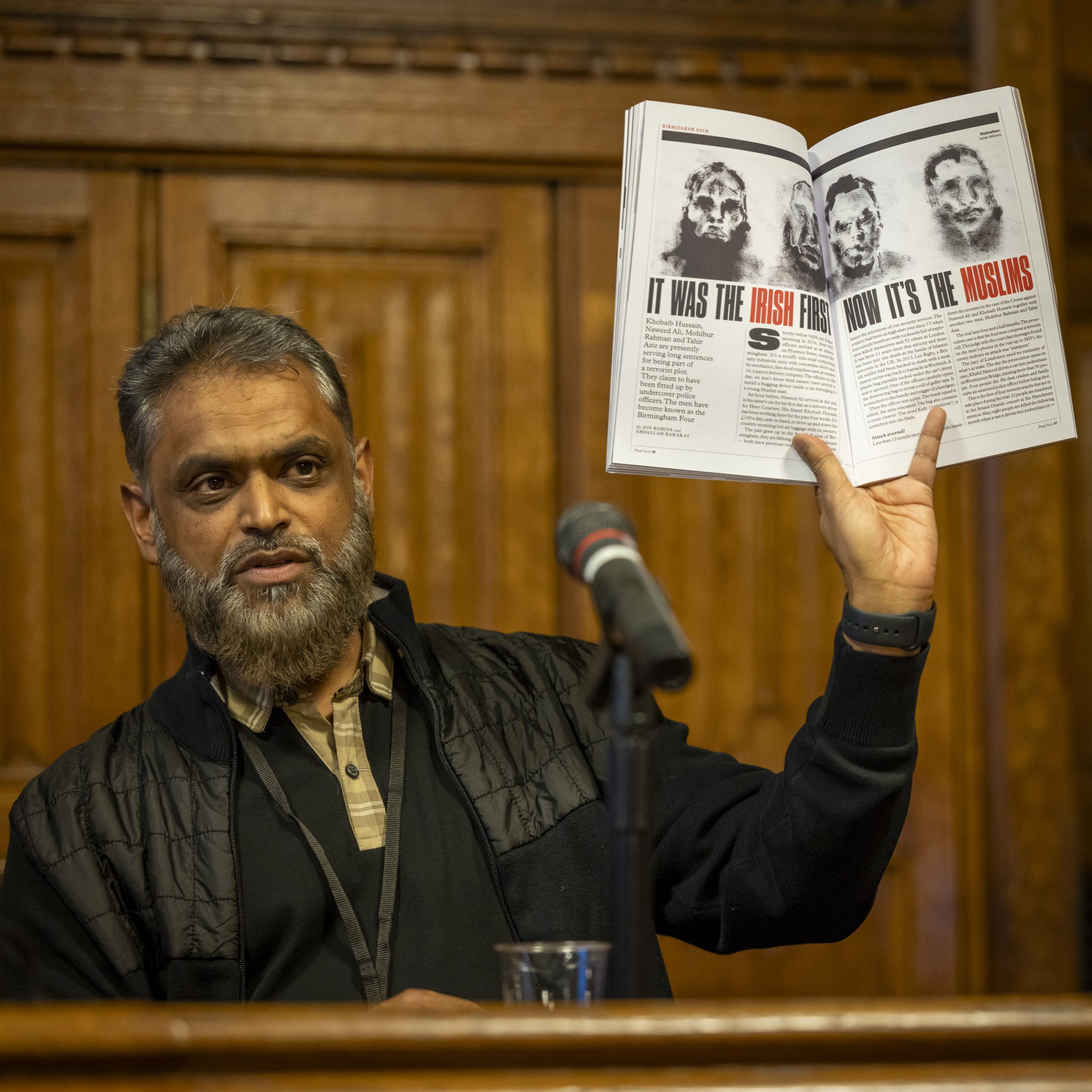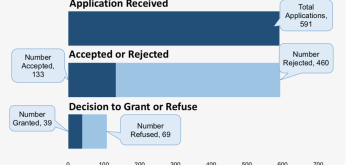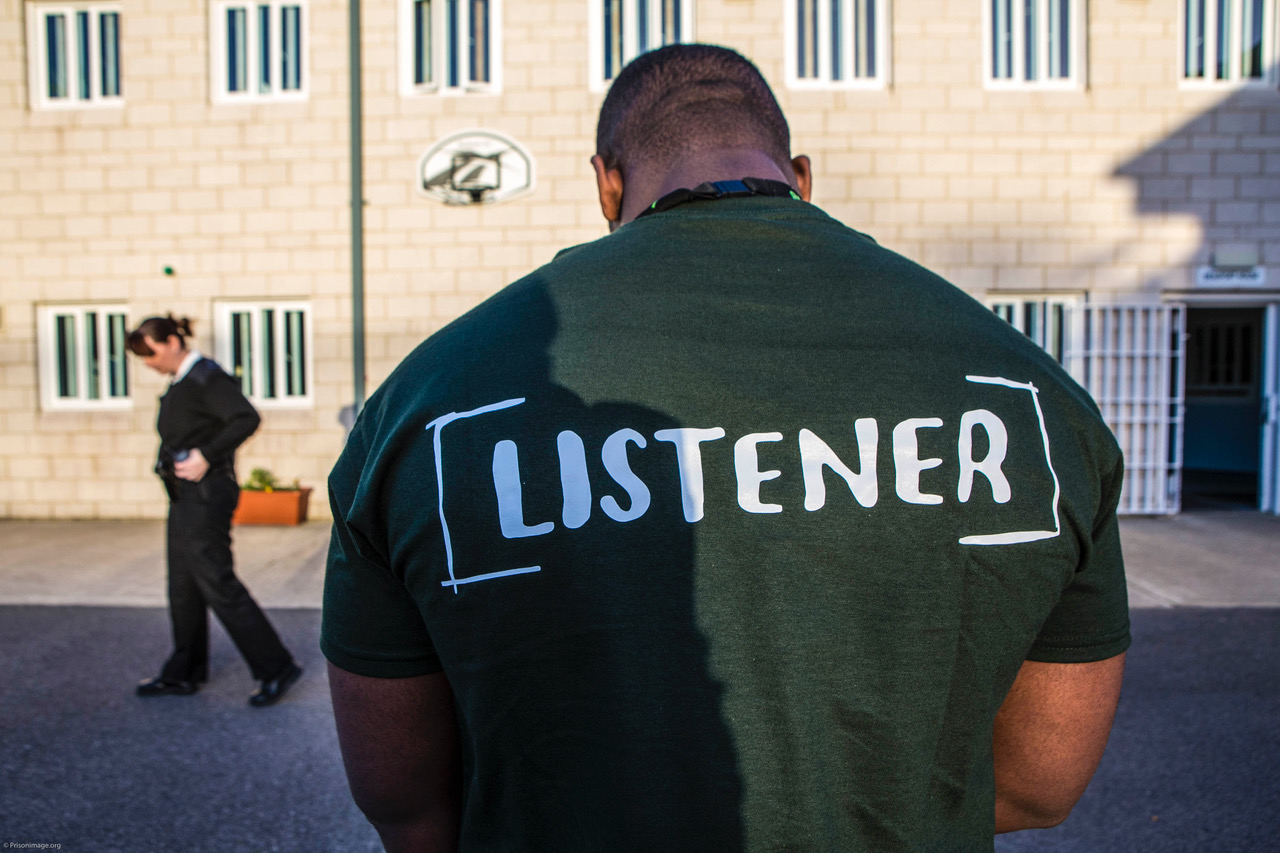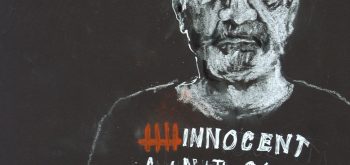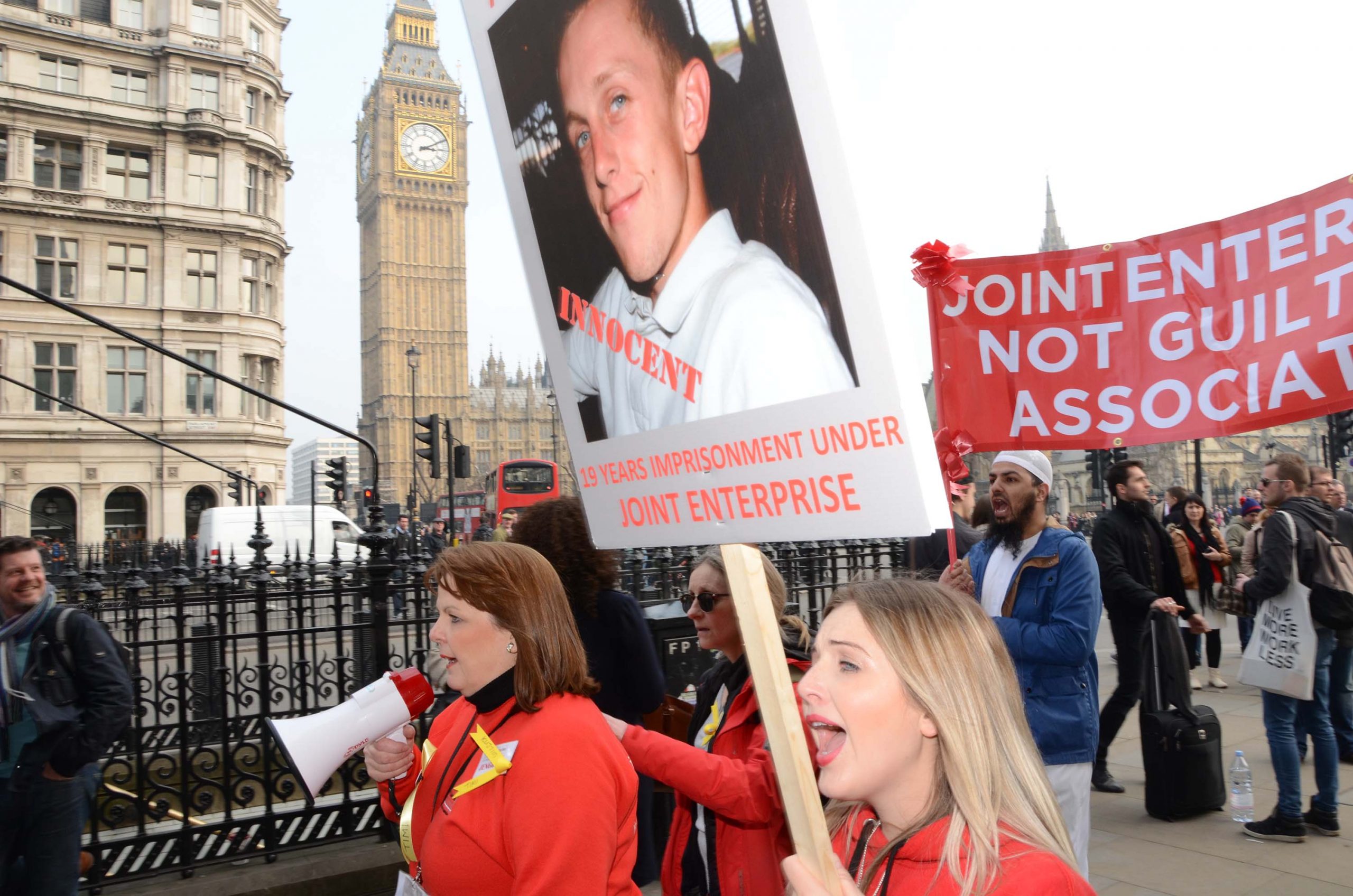The lawyer who represented the Birmingham Six told a packed meeting in parliament that history had repeated itself with the wrongful conviction of four young Muslim men in 2017. Gareth Peirce was speaking at the launch of the sixth issue of PROOF magazine on Tuesday night in packed committee room in the House of Commons.
The meeting highlighted the plight of the so called ‘Birmingham Four’ who are currently serving long sentences for taking part in an alleged bomb plot. The men claim to have been fitted up by corrupt undercover police officers who set up a fake courier company in central Birmingham in the hope one of the men, Khobaib Hussain, would incriminate himself as he chatted to co-conspirators running fabricated errands. It didn’t work.
After four weeks, the net was widened to include his friend and neighbour, Naweed Ali. On Ali’s first day of ‘work’ at Hero couriers, MI5 arrived to arrange the surveillance of his car and discovered a terrorist ‘kill kit’ with what appeared to be a partly-built pipe-bomb and a meat cleaver with the word Kafir (‘unbeliever’) scratched into the blade. The men claim the bag was planted when Ali handed his car keys to the man that he thought was his boss who offered to park his car inside the work unit to avoid parking restrictions. That man was subsequently revealed to be an undercover police officer working for a special unit of West Midlands police. Hussain and Ali were convicted alongside Mohibur Rahman and Tahir Aziz. Aziz only met Hussain and Ali once.
Ali and Hussain’s lawyers, solicitor Gareth Peirce and barrister Stephen Kamlish KC, told parliamentarians and journalists at the meeting that the case represented a uniquely appalling miscarriage of justice. ‘This is a year of anniversaries,’ said Peirce, who acted for the Birmingham Six and Gerry Conlon of the Guildford Four. The solicitor is currently acting for Julian Assange and Shamima Begum. It is 50 years since the pub bombings that led to the conviction of the Birmingham Six. ‘The question that gets asked: Could this ever happen again? My reply is that it already has,’ she said. ‘This is the case in which it happened.’
Stephen Kamlish KC has called the verdict ‘utterly Islamophobic’ by a jury ‘who didn’t care that the whole of the evidence was bent’. ‘People were getting increasingly nervous and scared about being the next victim. Who’s going to let somebody – let alone, a Muslim with a beard accused of terrorism – out at this time?’ he told PROOF magazine.
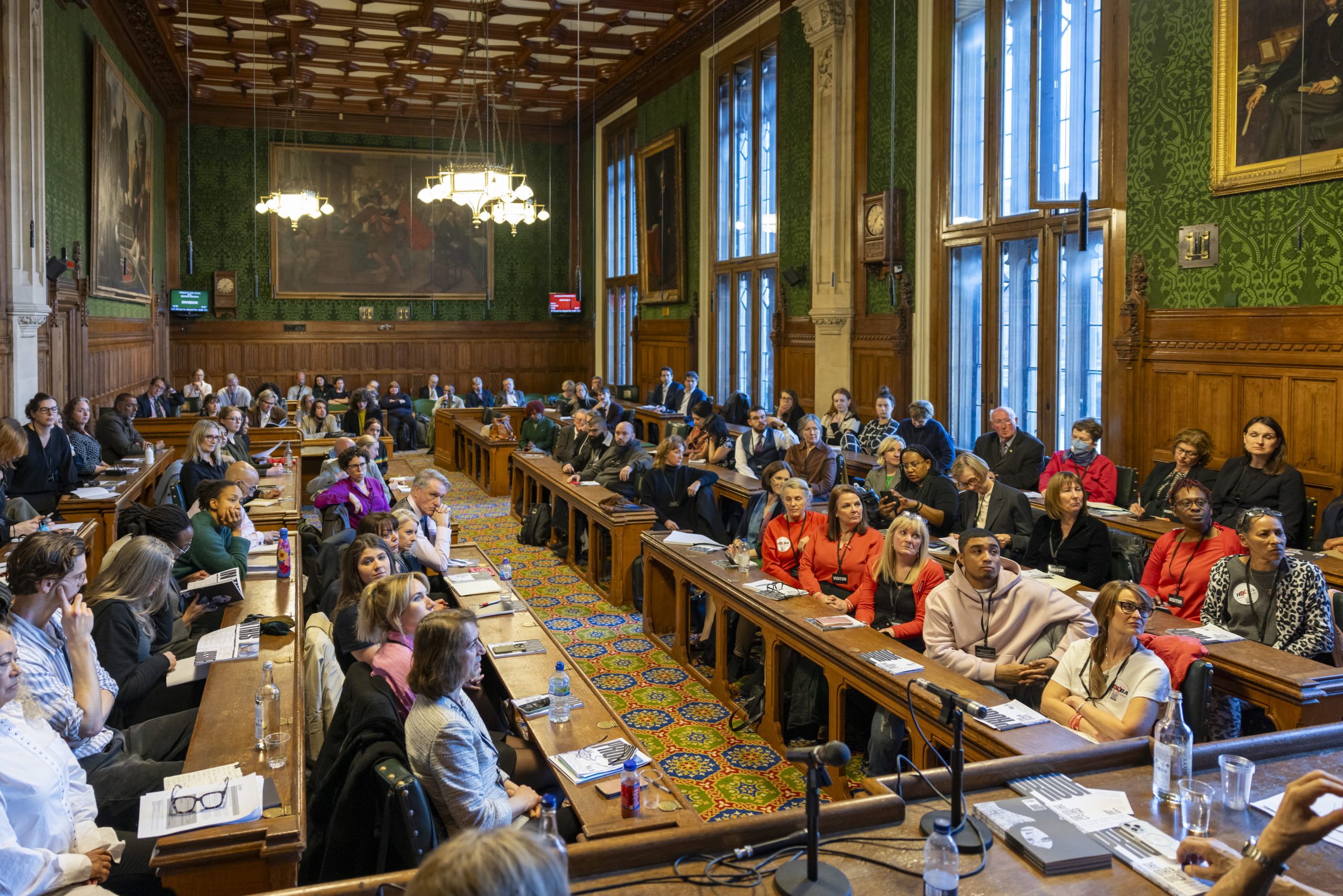
Photos: Andy Aitchison
The day after the jury’s verdict in 2017, Peirce did something that she had never done before. She published a public statement on her firm’s website: ‘We register our unqualified respect for the system we have of trial by jury in this country. But jurors can on occasion get things wrong.’
Mariam Hussain, Khobaib’s sister, read out a letter from her brother to the meeting – see below.
- This week’s meeting was chaired by Barry Sheerman MP, chair of the All-Party Parliamentary Group on Miscarriages of Justice and co-director of the Future Justice Project, and hosted by Lord Tony Woodley.
- PROOF magazine was sponsored by the Future Justice Project
- Buy PROOF here
- You can read about the Birmingham 4 on the Justice Gap here and on CAGE’s site here
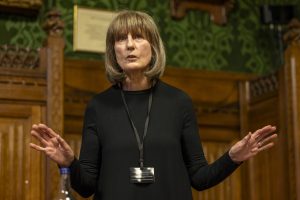
Gareth Peirce
A watershed moment
Former detainee at Guantanamo Bay, Moazzam Begg chaired a panel discussion on the Birmingham Four case. ‘It was like being a witness to a bizarre replay of history,’ he said after the event. ‘Chairing a packed meeting in parliament where Gareth Peirce, who once fought to free her Irish clients falsely imprisoned for terrorism in the 1970s, now fighting for four innocent Muslims facing the same ordeal five decades later’.
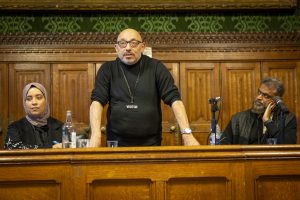
Stephen Kamlish KC
‘MPs, peers, lawyers, legal reform activists, journalists and former prisoners were all there,’ said Begg, senior director at CAGE International. ‘No one left not knowing about the plight of the Birmingham 4. It was a watershed moment.
The case must now be reviewed diligently by the Criminal Cases Review Commission – an independent body born out of the injustices of the Birmingham 6 and Guildford 4.’ An application on behalf of the men was made to the Criminal Cases Review Commission earlier this month.
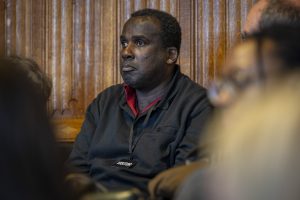
Oliver Campbell
PROOF #6 features a series of long-read articles about a number of shocking and unresolved cases including the Birmingham Four, the Manchester 10, Oliver Campbell, Jason Moore as well as JENGbA. Most of those campaigns were represented in the room including Oliver Campbell, presently midway through a hearing at the Court of Appeal, who came with his former MP, Sandy Martin.
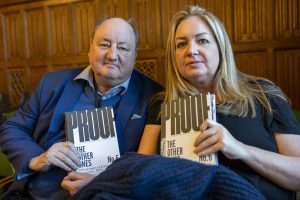
Lord Monson and Kirstie Moore
Kirstie Moore, sister of Jason Moore, attended together with supporters including the Bishop of Stepney, Joanne Grenfell, Lord Monson and the journalist Charles Thomson who wrote about the case for PROOF.
Amie Benguit, sister of Omar Benguit came with the the BBC journalist Bronagh Murno who has made two documentaries about his case – more here. Omar is currently on the same wing as Khobaib Hussain.
Winston Trew of the Oval Four – wrongly convicted in 1972 as a result of the actions of a corrupt police officer DS Derek Ridgewell – also attended. His conviction was overturned in 2019. The issue featured an interview with Andrew Malkinson by the Guardian’s Emily Dugan. Malkinson sent a video message to the meeting.
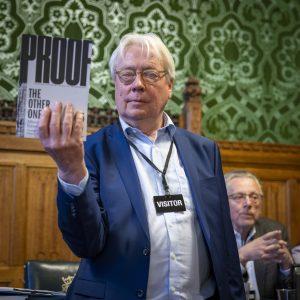
Glyn Maddocks KC
Glyn Maddocks KC, director of the Future Justice Project, paid tribute to Andrew Malkinson: ‘We are all immensely indebted for his dignity and generosity of spirit. When he had the media’s full attention, he reminded everyone that he was by no means the only one.’ Maddocks has represented Oliver Campbell for around 20 years.
A voice in parliament
The evening featured speeches from contributors to PROOF. ‘It really matters that the wrongly convicted have a voice in parliament,’ said veteran journalist David Jessel, the former presenter of the BBC’s pioneering Rough Justice. ‘When you’ve lost everything – your liberty, your family, your career, your reputation, and are living in a violent penal slum for something you didn’t do – you have to rely on the concern and vision of people who have the imagination to picture your plight, and the outrage at your predicament, and the commitment to try to do something about it.’
At the end of last year, Jessel, a former commissioner at the Criminal Cases Review Commission, chaired a Future Justice Project roundtable discussion involving lawyers, campaigners and activists who either campaigned for or worked for the commission in its earlier says. The idea of the event was to explore how and why the embattled organisation had lost its way over the years. The event was attended by the judge Sarah Munro who is heading the government review of the CCRC as well as Penney Lewis, who is heading the Law Commission review of criminal appeals. ‘We came as candid friends of the CCRC,’ he said; before adding: ‘It was the Ministry of Justice who undermined the CCRC; crucially with the complicity of the CCRC itself. Whitehall always hated the idea of a CCRC which ran itself.’
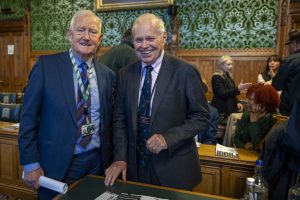
Barry Sheerman and David Jessel
Jessel pointed to an analysis of the number of referrals made by the CCRC in PROOF by Dr Steve Heaton. There has been growing concern in recent years about how few cases that the CCRC was sending back to the courts since the number of referrals crashed in 2016 to just a dozen. Jessel explained that the new analysis showed that ‘if you strip out the postmaster convictions, strip out the important but basically formulaic asylum cases, strip out the cases where the law has changed, strip out the cases with multiple defendants, and where the work was basically done by the courts, you end with just 16 cases successfully referred on the basis of the CCRC’s own initiative in the past eight years.’
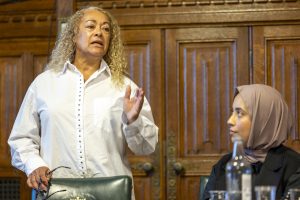
Kim Johnson – and Mariam Hussain
Kim Johnson MP told the meeting about the progress of her Joint Enterprise (Significant Contribution) Bill to tighten up the controversial law limiting its application to those who make a ‘significant contribution’ to a crime. ‘Joint enterprise is a massive miscarriage of justice when you’ve got 13 year old boys being incarcerated for 13 years for a crime that they haven’t committed,’ she said. ‘My bill was heard on the second of February, but as you can imagine, it wasn’t a bill that the Tories wanted to accept or did accept. But it gave me the opportunity to raise the profile, to raise awareness of joint enterprise and I did commit to JENGbA that I would carry on fighting on their behalf.’ The Labour government has committed to reform joint enterprise although there is no detail as to what that would mean.
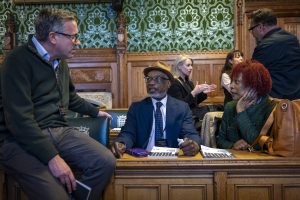
Matt Foot with Winston and Hyacinth Trew
‘The issue that makes me the most ashamed to work within the criminal justice system is the that of compensation and wrongful convictions,’ Matt Foot, APPEAL’s co-director told the room. The lack of adequate compensation arrangements or support post-release is a priority for the APPG on Miscarriages of Justice. ‘The myths that people have when people come out of the Court of Appeal with the cameras flashing and the front0page news that follows that, is that people are compensated, that somehow they are looked after -that’s what the public thinks. But we’ve come to a position where virtually nobody is looked after.’
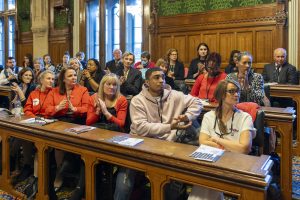
JENGbA in the red
The solicitor represents Sam Hallam whose case, along with Victor Nealon’s, is currently being heard by the European Court of Human Rights. ‘Less than 4% of applicants for compensation on the statutory scheme received compensation – more than 96% are refused,’ Foot said. ‘Sam is not the only one. There are hundreds of people in this position, who walk out of the Court of Appeal wrongly convicted, now innocent, who don’t receive a penny and it’s high time that we started to take responsibility for these people.’

Nisha Waller
A black box we never open
Nisha Waller, a researcher on racism with APPEAL, talked about her work with colleague Naima Sakande on majority verdicts. Waller points to the Supreme Court in the US in 2020 outlawing such verdicts recognising their racist past – majority verdicts were introduced in Louisiana in 1898 to undermine the votes of African American jurors. In her PROOF article, Waller explore the similarly racist origin story of majority verdicts introduced on this side of the Atlantic in 1967 as a response to public anxiety about immigration.
‘Andrew (Malkinson) and Winston (Trew)’s juries were not responsible for their wrongful convictions,’ Waller explained. ‘In Andrew’s case, crucial evidence of their innocence was withheld from them, and in Winston’s case, they were lied to by the police. However, we should not ignore the fact that neither of them would have been convicted had it not been for a particular jury rule that allows for convictions when a jury do not does not agree known as majority verdicts.’
She continued: ‘If the jury were required to convict unanimously Andrew would not have spent 17 years in prison, and Winston may not have spent almost a century fighting to overturn his conviction.’ Waller pointed out that neither the Court of Appeal nor the CCRC collect data on juries ‘but we’ve been able to identify dozens of wrongful conviction cases that were the result of a split jury decision’. She called juries ‘a blackbox that we never open’. ‘The Court of Appeal refuses to investigate allegations of racism and prejudice in jury decision-making,’ she said.
A message from Khobaib Hussain of the Birmingham 4 (as read by Mariam Hussain)
‘It’s become so easy to convict someone for a crime they have not done. All you have to do is convince 12 random jury members but in my case 11 who ignored the facts and evidence. Sometimes I think, how did this all happen in the UK, a state who talks about human rights abuses? But this is an abuse. Look at the number of cases we all know of including fellow prisoners such as Omar Benguit who is on my wing. He has been in prison for over 20 years. There needs to be proper accountability and deterrents so corrupt police officers never imagine doing such a thing in the future. These deterrents need to be that corrupt officers are tried and convicted for perjury, fabrication of evidence, corruption and criminal behaviour.’
Buy PROOF, support the Justice Gap


